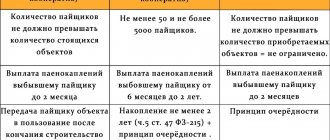Concept
The precise definition of this term is important for resolving various disputes. To determine which family members can be included in the named unit of society, it is necessary to familiarize yourself with the legislative norms. Housing and marriage and family law will help with this.
Typically, the concept of family members is used when applying for subsidies for utility bills, as well as for providing documentation to the administration for improving housing conditions.
The family is under state protection. This is enshrined in Article 1 of the RF IC. It also says that marriage is registered with the civil registry office. In the family, all members manage the household and raise children. They have rights and responsibilities.
Inheritance by law or will
In the matter of inheritance, much will depend on the existing will. If it is missing, then after six months the heirs will be able to receive it, but only in order of priority. There are first, second and subsequent stages and they are clearly stated in the legislative norms.
The testator has the right to dispose of his property or property himself and he is not obliged to leave it to relatives or family members. These can be friends, organizations or legal entities and individuals.
However, there are a number of restrictions when, despite the will, a circle of direct relatives has the right to their obligatory share in the inheritance. This is especially true for minor children or dependents - spouses, parents, etc.
Expert opinion
Makarov Stanislav Tarasovich
Legal consultant with 8 years of experience. Specialization: criminal law. Extensive experience in document examination.
Often these issues have to be resolved in court. Sometimes a situation arises when a complete stranger claims his rights and talks about a family connection and shows the relevant documents to confirm this.
Who are the family members?
According to the Criminal Procedure Code (clause 4, article 5), family members:
- spouse;
- parents;
- children;
- adoptive parents and adopted children.
These also include:
- siblings;
- grandparents;
- grandchildren.
Moreover, no other family members can be included in this social group. It should be noted that the relatives that make up it may or may not be blood relatives. But they must have a common household. They also financially support each other.
In housing legislation, the definition of family composition may vary depending on whether the family lives in an apartment that is owned or rented under a contract. Documents confirm cohabitation, for example, a birth certificate or housing papers. This is required in resolving various disputes.
The concept of relatives in tax, housing, labor law
Taxation could not help but touch upon the term, since it also falls under an article of the Tax Code. One of them states that transactions between close relatives cannot be taxed.
In addition, based on the Family Code, tax authorities will not charge an additional fee if the income was received as a gift, but only in the case of close connections. This includes not only siblings, but also family members.
However, you have to pay a notary fee and its amount depends largely on the degree of relationship. For loved ones it will be 0.3 percent if the total amount does not exceed one hundred thousand rubles. For other relatives it will cost twice as much, but the total amount should not exceed a million rubles.
Interestingly, the concept is actually absent from the Housing Code. But the term “family member” occupies a dominant place.
Not only spouses and their children are considered such, but also the owner’s parents, especially if they live together. Moreover, if the owners voluntarily move in a third person, then he too becomes a member of the family, although he will not have family ties.
This partially affects dependents who are unable to work and non-adopted individuals.
This issue is not clearly spelled out in the Labor Code. True, one of the articles allows you to take unpaid leave in connection with the death of close relatives. Therefore, distant relatives or close family members are not mentioned and each employer is inclined to interpret the article as he wants. After all, even spouses are not included in it.
In addition, this circle of people cannot, for example, work together in municipal institutions, especially subordinate to each other. If someone close to you is serving a sentence or has already served it, this leads to the fact that you may not pass the test when the opportunity to get a job arises.
This applies most of all to the banking sector and law enforcement agencies. Such discrepancies in codes can be both useful and harmful if a controversial situation arises and it needs to be resolved legally.
Who can be a family member?
Citizens who are not considered relatives of the owner of the premises can also be defined as family members. This is observed when they live in one place and are settled there by the owner of the property. It is also important that a person not only lives in the premises, but also has some relationship with the owner and other people living with him in the same living space.
Family members have relationships with each other based on mutual respect, mutual care, non-property and property rights. Their economy, as already mentioned, should be common. Rarely are family members people who are not officially considered relatives.
Definition of the term "family"
In the modern understanding of the word “family” is a term denoting the long historical development of relationships between people who are sealed by marriage . It is by the presence of marriage or blood relationship that one can determine whether people are a family.
It is very important that such citizens manage a common household and raise children, if they have any. They have common responsibilities and rights.
Who can be considered family members?
Family members of the owner of a residential premises (house, apartment, room) are people such as:
- parents;
- spouse;
- children.
To confirm kinship when living in the same living space, relatives must have confirmation that they live together and have a common household, and also provide each other with financial support. Who can confirm the process of living together of some people? This is primarily written and oral testimony from neighbors, photographs of relatives where they are together.
Who can become a family member?
Citizens who are not relatives
owner of a residential premises, at the same time can become family members. This happens when they begin to live in one place and are moved there by the owner of the premises.
It is also necessary that a person not only live in a residential building, but also have certain relationships with the owner of the apartment and other people who live in the premises. There must be family relationships that are based on mutual respect, mutual care, and certain non-property and property rights of family members.
It is necessary to conduct general housekeeping.
can become a member of the owner’s family . These include such as sister and brothers, grandparents, aunts and uncles, and other relatives. In rare, exceptional cases, they may become people who are not relatives.
Depending on the type of legislation, there are different definitions of who can be family members.
Article 14 of the RF IC
Article 14 of the RF IC is of particular importance in this issue. It contains conditions for the impossibility of marriage. According to this article, they are as follows:
- the presence of an undissolved marriage;
- close relationship;
- marriage between adoptive parents and adopted children;
- if at least one person is incapacitated.
These conditions will not allow you to start a family, but in other cases there are no obstacles to marriage.
The property and non-property rights of married people are outlined in Articles 31 and 32 of the RF IC. By law, they have the right to protect their interests if they have been infringed.
Are they close relatives...
…husband and wife
Expert opinion
Makarov Stanislav Tarasovich
Legal consultant with 8 years of experience. Specialization: criminal law. Extensive experience in document examination.
However, marriage is a special type of relationship, secured by a special document (marriage certificate), a legal union that implies many privileges, including:
- Right of inheritance . In the absence of a will, the widow or widower is the first priority claimant to the inheritance along with the children and parents of the deceased, despite the lack of blood relationship (see “Is the inheritance divided between spouses?”);
- Joint marital property . Everything that is acquired by a husband or wife during their legal marriage belongs to them on equal rights, regardless of who acquired it and with what means. If necessary, joint property can be divided equally.
Adult citizens of different sexes can enter into marital relations, except in cases...
- one of them is legally married;
- presence of blood relationship (mother and son, father and daughter, grandfather and granddaughter, grandmother and grandson, brother and sister);
- the existence of a relationship between an adoptive parent and an adopted child;
- one of them has incapacitated status;
...ex-spouses
Former spouses, that is, husband and wife who have legally dissolved their marriage, lose all relations with each other. They are no longer family members and do not have the special privileges that the law grants to spouses (see “Is the ex-wife an heir”).
…grandmother
The grandmother is a close relative for her grandson and granddaughter in accordance with Article 14 of the RF IC and other legislative acts.
A grandfather, like a grandmother, is a close relative to a grandson and granddaughter.
A grandson and granddaughter are a close relative to the grandparents on the father's or mother's side.
...mother-in-law
The father-in-law and mother-in-law are not relatives - in relation to the daughter-in-law, father-in-law and mother-in-law - in relation to the son-in-law. The law calls such relationships a property. This category also includes the relationship between stepfather, stepmother and stepson, stepdaughter, as well as other relationships. However, relatives can be considered family members.
…brother or sister
Full-born (born from a common father and mother) and not full-born (born only from a common father or only from a common mother) are close relatives.
…cousin or brother
Unlike siblings, the law does not classify cousins as close kinship. For example, if we are talking about inheritance, then they relate only to the third line of heirs, and then only by right of representation instead of the aunt or uncle of the deceased.
...brother's wife or wife's brother
The wife of a brother or sister, the brother or sister of a wife - there are no relations of consanguinity between these persons, but there are relations of property arising from a marriage between relatives.
Marriage and family legislation
According to the law, the family begins with the official registration of the marriage of the spouses. If everything is documented, the parties acquire official rights and obligations.
The Family Code includes rules for marriage. This is stated in Article 10 of the RF IC, which defines the rights and obligations of spouses. Divorce is also regulated by the RF IC - Article 16.
After a divorce, the rights of children should not be infringed. The responsibility for their maintenance falls on the parents (Article 80 of the RF IC).
According to marriage and family law, adopted children are considered family members. After completing the relevant documents, such parents and children also have rights and responsibilities towards each other. And although in this case there cannot be common ancestors, it is still a family. This is confirmed by an adoption or guardianship document.
Definition of the concept of “close relatives” according to the legislation of the Russian Federation
Who does the law define as close relatives? It’s logical to start searching for an answer to the question with the Family Code. There is no separate article defining the concept in the normative act. Listing the circle of persons with whom it is prohibited to marry, Article 14 of the code defines the term “close relatives”.
RF IC, Article 14. Circumstances preventing marriage
“It is not permitted to enter into marriage between:
close relatives (relatives in a direct ascending and descending line (parents and children, grandfather, grandmother and grandchildren), full and not full (having a common father or mother) brothers and sisters)..."
Family Code of the Russian Federation dated December 29, 1995 N 223-FZ (as amended on December 30, 2015)
The content of the concept of “close relatives” is disclosed in the Family Code of the Russian Federation
The Civil Code agrees with this definition. Article 37 states:
Civil Code of the Russian Federation Article 37. Disposal of the property of a ward
The guardian, trustee, their spouses and close relatives do not have the right to enter into transactions with the ward, with the exception of the transfer of property to the ward as a gift or for free use, as well as to represent the ward when concluding transactions or conducting legal cases between the ward and the spouse of the guardian or trustee and their relatives relatives.
Civil Code of the Russian Federation (Civil Code of the Russian Federation)
Civil Code of the Russian Federation, Part 1, adopted on October 24, 1994, No. 51-FZ
Housing legislation
Each family member has the right to living space. This is confirmed by Article 40 of the Constitution of the Russian Federation. But usually with a divorce there is a need to divide the premises, because no one’s rights should be infringed. The norms for this procedure are established by Article 38 of the RF IC. Most housing issues are resolved through the court, which makes it possible to divide the living space.
Family members of a child are parents, brothers, sisters. The owner of the home has the right to move in relatives who are dependent on him, as well as disabled citizens and other persons who are not relatives.
Please note that the concept of “family member” is defined differently in marriage and family and housing legislation. In the first case, this is a person who is related and also has the same ancestors. Accommodation may also be separate. And according to housing legislation, a family member must live with the main tenant and have a residence permit.
The rights of family members of the homeowner: how they arise and when they cease
April 29, 2021 3:52 pm
Lawyers were told about new legal structures that can be used to protect housing rights along with existing instruments of civil and housing legislation
On April 29, the Federal Chamber of Lawyers of the Russian Federation held another training webinar for lawyers. Irina Emelkina , Professor of the Department of Private Law Disciplines, Academic Director of the National Research University Higher School of Economics master's program "Lawyer in Civil and Criminal Cases", Doctor of Legal Sciences , who gave a lecture on the topic of the use of new obligatory structures in disputes between the owner of residential premises and members of his family .
At the beginning of her speech, the speaker noted that with the reform of the Civil Code of the Russian Federation in 2015, new legal structures were introduced: astrent (judicial penalty) and assurances of guarantee. These institutions are still being conceptualized by theorists and practitioners. They are primarily focused on the business environment, but they should also be used in protecting housing rights, along with existing instruments of civil and housing legislation.
In particular, according to Art. 308.3 of the Civil Code of the Russian Federation, in the event of a debtor’s failure to fulfill an obligation, the court, at the request of the creditor, has the right to award in his favor a sum of money in an amount determined on the basis of the principles of fairness, proportionality and the prevention of profiting from illegal or dishonest behavior. The lecturer explained that the Supreme Court of the Russian Federation, in Resolution of the Plenum of March 24, 2021 No. 7, established that not only obligations in kind can be secured by astrent in the event of non-execution of a court decision, but it can also be declared in case of a negative claim. This tool, added Irina Emelkina, is widely used in claims relating to rights to land plots.
The second design is assurances of obligations (Article 431.2 of the Civil Code of the Russian Federation), including those relating to the rights of citizens to residential premises. The lecturer drew attention to the fact that the notary community supported this design in protecting the rights of the purchaser of residential real estate if, after its alienation, the right to reside in this premises is retained by former members of the seller’s family. In this regard, civil contracts providing for the alienation of housing include clauses stating that the seller, as well as third parties (members of his family) guarantee the legal purity of the transaction. The speaker emphasized that damages for false information in this case are recovered not only from the seller, but also from third parties who provided these assurances.
According to Irina Emelkina, in the last decade the topic of the rights of family members of the owner of residential premises has given rise to many problems. The state had different attitudes to the provisions regarding what rights these individuals were endowed with. Thus, the speaker explained, in 1994, when the Civil Code of the Russian Federation was adopted, Art. 292 contained a rule that family members of the owner of the property have the same rights to live there as the owner. In addition, it was stipulated that this right has the property of being followed, which gave rise to negative consequences for purchasers of residential real estate.
With the adoption of the new Housing Code of the Russian Federation, the rights of family members of the owner of a home during its alienation have changed. According to the new version of Art. 292 of the Civil Code of the Russian Federation, the rights to use alienated residential premises are not retained by family members of the seller. At the same time, the Housing Code of the Russian Federation established that persons who lived with the tenant of the residential premises at the time of privatization, who had the right to privatization, but did not use it, are endowed with an indefinite right to use the residential premises. Thus, this did not solve the problem for bona fide purchasers.
The speaker emphasized that the rights of family members of the homeowner are not defined as property rights in Russian legislation. Abroad, for example, they are characterized as personal easements.
In particular, the legal status of the owner’s family members is determined by Art. 292 of the Civil Code of the Russian Federation and Art. 31 Housing Code of the Russian Federation. Since there were serious gaps in the regulation of these relations, in 2009 the Plenum of the Supreme Court of the Russian Federation adopted Resolution No. 14 of July 2, where it tried to explain in detail issues related to the rights of family members of the homeowner, including former ones.
The lecturer drew attention to the fact that when considering disputes of this category, judicial discretion is widely used. In similar situations, some courts retain the right of former family members of the home owner to reside in the given residential premises, while others refuse. The whole point, Irina Emelkina emphasized, is in the evidence base. “In each case it is necessary to understand and clearly select evidence. In addition, the Constitutional Court of the Russian Federation has repeatedly pointed out the need to maintain a balance of interests when resolving such disputes,” she added.
The speaker noted that Art. 19 of the Federal Law of December 29, 2004 No. 189-FZ “On the entry into force of the Housing Code of the Russian Federation”, which established the indefinite right of residence for family members of the owner, including former ones, who at the time of privatization had equal rights with the tenant, gave consent to privatization, but did not take advantage of this right themselves. This rule protected the rights of such entities, but at the same time created problems for home buyers.
So, explained Irina Emelkina, according to Art. 31 of the Housing Code of the Russian Federation, the spouse, children, and parents living with him are recognized as members of the family of the owner of the residential premises. Other relatives, including disabled dependents and, in exceptional cases, other citizens, may be recognized as members of the owner’s family if they were installed by him as such. The Supreme Court of the Russian Federation, in turn, added that in order to recognize persons moved in by the owner as members of his family, it is sufficient to establish only the fact of their joint residence with the owner in a given residential premises (Resolution No. 14). At the same time, the court also needs to find out the will of the owner to move in these persons.
The speaker added that when considering such issues in practice, a problem arose: if family members of the owner of the property live in a given premises, but the owner does not, do the rules on the rights of family members to live apply? According to Art. 293 of the Civil Code of the Russian Federation - yes. In this case, the norms of the Housing Code of the Russian Federation are special and cannot exclude the effect of the provisions of the Civil Code of the Russian Federation.
The topic of the rights and obligations of family members of the homeowner, including those established by agreement between them, was also touched upon. The lecturer emphasized that capable and partially capable family members are jointly and severally liable with the owner for obligations arising from the use of housing, unless otherwise established by agreement. At the same time, she explained that, according to paragraph 4 of Art. 31 of the Housing Code of the Russian Federation, in the event of termination of family relations with the owner, the right to use this residential premises for the former family member is not retained, unless otherwise established by the agreement defining the procedure for using housing in such cases. This rule, noted Irina Emelkina, is dispositive. In this case, the agreement can be concluded both after the termination of family relations, and long before that (for example, upon marriage).
Regarding the rights of former family members of the owner, according to the speaker, judicial practice is replete with similar disputes. She drew attention to the fact that the issue of recognizing a person as a former family member of the homeowner in the event of a dispute is decided by the court, taking into account the specific circumstances of the case. In particular, the court should consider the possibility of preserving the former family member’s right to use residential premises for a certain period of time, regardless of whether they file a counterclaim for this. Irina Emelkina emphasized that the termination of family relations between the parents of a minor child living in residential premises owned by one of the parents does not entail the loss of the child’s right to use it.
However, the speaker noted, it should be remembered that the right of a family member of the owner, including a former one, terminates with the transfer of ownership of this residential premises to another person (Clause 5 of Article 31 of the Housing Code of the Russian Federation). “This circumstance actually destroys the rights of the former family member. All discussions about the possibility of preserving it on the basis of an agreement are broken by the act of free and unrestricted alienation by the owner of his property,” emphasized Irina Emelkina. If the former family member does not vacate the alienated premises voluntarily, the new owner has the right to demand his eviction in court.
In conclusion, the speaker analyzed judicial practice on disputes in this category.
The speaker's presentation can be found here, and the answers to questions can be found here.
Tatiana Kuznetsova
SharePrint Direct link to the material:
Share
Rights and obligations
If there are violations of the rights of one of the family members, they have the opportunity to resolve the problem through the court. In this case, a specific official document confirming the relationship is taken into account. The responsibilities and rights of family members are as follows:
- Grandparents can see their grandchildren (Article 67 of the RF IC). They also retain the responsibility for material and moral support in difficult situations. Children and grandchildren must help disabled relatives (Articles 94-95 of the RF IC).
- When adopted, a child becomes part of a new family. In this regard, adoptive parents acquire the rights and responsibilities for his upbringing, material maintenance and education.
- Older children should help younger ones if the latter are in need. This applies to material and moral support.
- Former spouses, although not considered relatives, are still part of the family, so they can demand maintenance and also help financially, for example, a sick spouse. Financial support is required for children after their parents divorce.
- Stepfathers and stepmothers, guardians and trustees, according to family law, are part of the family, although they are not blood. They and their children have rights and responsibilities, just like between relatives.
- Parents have the right not only to raise their children, but also the responsibility for their education and development.
- Children have the right to support and protection in the family. They also have the obligation to provide for disabled parents when they reach 18 years of age.
Who is legally included in the circle of close relatives
Kinship between people in sociology is defined as relationships arising from consanguinity or marriage.
In private law, close relatives are blood relatives in ascending and descending lines who have a common ancestor. Spouses are not close relatives. Relationships of property arise between them, developing on the basis of marriage. In-laws are also mother-in-law, mother-in-law, father-in-law, and father-in-law.
The family relationship pattern can include a wide range of people, but not everyone is considered close relatives
Close relatives and family members according to the Family Code (FC)
The Family Code of the Russian Federation introduces the concept of “family members” and defines the circle of persons related to them.
RF IC, Article 2. Relations regulated by family law
Family legislation establishes the procedure for the exercise and protection of family rights, the conditions and procedure for marriage, termination of marriage and recognition of its invalidity, regulates personal non-property and property relations between family members: spouses, parents and children (adoptive parents and adopted children), and in cases within the limits provided for by family legislation, between other relatives and other persons, determines the procedure for identifying children left without parental care, the forms and procedure for their placement in a family, as well as their temporary placement, including in an organization for orphans and children left behind without parental care.
Family Code of the Russian Federation dated December 29, 1995 N 223-FZ (as amended on December 30, 2015)
The article of the law states that the code considers one type of family characteristic of modern society. This is a nuclear (partner) family. Its basis is not the blood connection between generations of relatives, but the relationship between spouses. To paraphrase a famous slogan, this type of family can be defined as follows: “Mom, dad and I - a nuclear family.” Grandparents are not included in the family because their children have grown up and lost their child status. Article 54 of the Family Code explains who are considered children by law.
RF IC, Article 54. The right of a child to live and be raised in a family
- A child is a person who has not reached the age of eighteen years (the age of majority).
Family Code of the Russian Federation dated December 29, 1995 No. 223-FZ (as amended on December 30, 2015)
Family members are considered to be spouses and their minor children
Family members are husband, wife and their children or adoptive parents and adopted child. Grandparents remain close relatives.
Respect
While respecting your rights and obligations, you should not act to the detriment of other family members. This is enshrined in Article 7 of the RF IC. So, it is necessary to maintain silence when someone is resting. Otherwise, by exercising your right, you violate the interests of another person.
All family members are equal before the law. Nobody has any privileges. And every person has the right to protect their rights, excluding their abuse (Articles 64-66, 69 of the RF IC).
The family is an important unit of society, because it is necessary for the harmonious development of people. That is why the legislation establishes standards of behavior in it, as well as responsibility for violation of rights.








